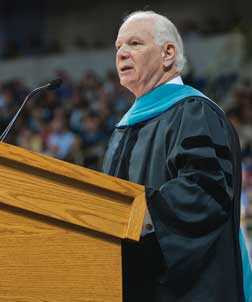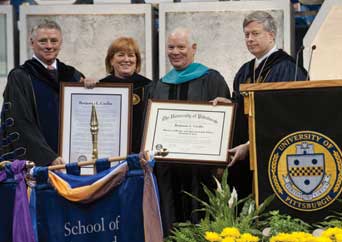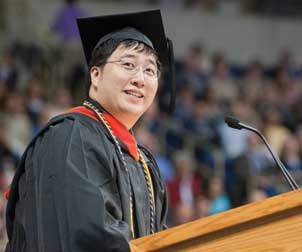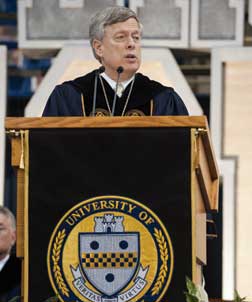Commencement 2011: “Don’t Just See the Light, Be the Light.”
This is the print version of the May 1, 2011, University of Pittsburgh commencement address delivered by Pitt alumnus U.S. Senator Benjamin L. Cardin (A&S ’64), a national leader regarding such issues as health care, retirement security, the environment, and fiscal policy. Prior to the address, Cardin received the degree of Doctor of Public and International Affairs Honoris Causa.
 Senator Benjamin L. Cardin
Senator Benjamin L. CardinI am happy and proud to acknowledge the outstanding leadership at Pitt: your chancellor, Chancellor Mark Nordenberg—what an outstanding chancellor we have at the University of Pittsburgh; the Provost and Senior Vice Chancellor, Dr. Patricia Beeson; and the Chairman of the Board of Trustees, Stephen Tritch.
Congratulations to you, the graduates, and thanks to all the families who made the sacrifices for you to reach this day.
When I asked Chancellor Nordenberg how long I should speak, he said, “As long as [you] want to, but do not exceed 140 characters”—OMG.
When I was sitting where you are when I graduated from the University of Pittsburgh with my family in attendance, I never expected to be invited back one day to give the commencement address. Of course, I expected to return for reunions, to see a football or basketball game, or to watch my Baltimore Ravens take on their nemesis, the Pittsburgh Steelers … just making sure you were listening.
But now I have been given the privilege to receive an honorary degree from Pitt. My mother would be so proud, and my father would be relieved that he does not have to write yet another check to Pitt for this degree.
My years at Pitt were very special. I loved going to a university that was part of a city. I loved going to football games with my fraternity brothers. I loved going to a school that prepared me for my profession. And I loved being able to take interesting electives that were not part of my major.
Pitt allowed me to explore different interests. Those who know me well will attest that I am challenged in the creative arts. Maybe that’s why I went into politics.
Pitt encouraged me to take courses outside of my comfort zone, such as the Introduction to the Arts, where I learned the difference between Doric, Ionic, and Corinthian columns; but more importantly, I learned to appreciate the beauty and creativity of the arts.
So after an ugly Senate debate on the merits or demerits of a government shutdown, I can re-center myself, appreciating the beauty of the U.S. Capitol building. Thank you, Pitt.
 Senator Benjamin L. Cardin received the degree of Doctor of Public and International Affairs Honoris Causa during Pitt’s May 1 commencement. From left, Pitt board chair Stephen R. Tritch, Pitt Provost and Senior Vice Chancellor Patricia E. Beeson, Cardin, and Pitt Chancellor Mark A. Nordenberg.
Senator Benjamin L. Cardin received the degree of Doctor of Public and International Affairs Honoris Causa during Pitt’s May 1 commencement. From left, Pitt board chair Stephen R. Tritch, Pitt Provost and Senior Vice Chancellor Patricia E. Beeson, Cardin, and Pitt Chancellor Mark A. Nordenberg.While I certainly did not know then that my career would be spent in politics, I can say with confidence that the student government at Pitt was a great preparation. We formed political parties, won hard-fought campaigns, and encouraged tolerance for different views.
But the most important part of Pitt is the lifelong friends I made. We get together for reunions and to reminisce about our days here. We celebrate Pitt’s victories with texts and e-mails. We take vacations together. And my Pitt friends even came to Maryland five years ago to help me campaign for the United States Senate.
Many of them are here today to share this very special occasion with me. I am grateful for their friendship and hope that you, too, will keep your friends from Pitt to share all of life’s adventures.
So much has changed since my friends and I were on campus, but the challenge for your generation is the same as it was for mine.
President John F. Kennedy made that clarion call summoning my generation to public service. He said in his inaugural address, “Let the word go forth that the torch has been passed to a new generation of Americans… To those people in the huts and villages… struggling to break the bonds of mass misery, we pledge our best efforts to help them help themselves…”
Two months later, he created the Peace Corps, now celebrating its 50th anniversary. The founder and first director of the Peace Corps, Sergeant Shriver, said on its 25th anniversary, “Be servants of peace. Weep with those who are sorrowful, rejoice with those who are joyful, teach those who are ignorant. Care for those who are sick. Serve your families. Serve your neighbors. Serve your cities. Serve the poor. Join others who serve. Serve, serve, serve! …For in the end, it will be the servants who save us all.”
 Student commencement speaker David Gau, who graduated from Pitt May 1, was named the 2011 Omicron Delta Kappa Senior of the Year. He also received the 2011 Whitaker International Fellows and Scholars Program award as well as a Rotary Ambassadorial Scholarship, which will allow him to study at the University of New England in New South Wales, Australia.
Student commencement speaker David Gau, who graduated from Pitt May 1, was named the 2011 Omicron Delta Kappa Senior of the Year. He also received the 2011 Whitaker International Fellows and Scholars Program award as well as a Rotary Ambassadorial Scholarship, which will allow him to study at the University of New England in New South Wales, Australia.Recently, while traveling in Morocco, my wife, Myrna, and I visited a rural community, where we met with a Peace Corps volunteer. She was teaching Moroccan women how to be entrepreneurs, so they could receive fair profits from their work as artists. In too many countries in that region of the world, women laborers are abused and not fairly compensated for their work. In Morocco, that Peace Corps volunteer is making a difference.
The Peace Corps captures the essence of our country at its best—highlighting America’s strengths and demonstrating that each of us can make a difference. We live in a country that rewards innovation and risk taking, where creative people can make a dream real. After all, we are the nation that gave the world Apple, Google, Facebook, Twitter, and Lady Gaga.
Pitt has given you the foundation for pursuing a vocation that is both satisfying and rewarding. You are now part of a select group. Did you know that fewer than one in three Americans have a bachelor’s degree? Or that worldwide, fewer than one in 15 graduate from college? But with privilege comes responsibility.
While you are all necessarily focused on what your vocation will be, I would like to take a few moments to talk about your avocation. Regrettably, society doesn’t always recognize avocation as something to value. Winston Churchill summarized the distinction best by saying, “We make a living by what we get, but we make a life by what we give.”
Your avocation is your calling. It’s a mysterious force—a quiet but determined voice—deep inside you, compelling you to do something, somewhere, somehow for the greater good. Your obligation is to pay attention, to heed that voice, to recognize and cultivate that calling, and to act on it. As Dr. Martin Luther King Jr. said, “Everybody can be great. Because anybody can serve.”
We don’t cultivate that calling in a vacuum. Rather, we are impacted by the people and the communities in which we live. The University of Pittsburgh is a unique institution that instills in each of you an individual responsibility to challenge yourself to do more. I am proud of the fact that Pitt was the top-ranked public “Best Neighbor” educational institution in the most recent edition of “Saviors of Our Cities.” Give yourselves a round of applause for that!
Several criteria are used to rank the schools. Student and faculty involvement in community is one.
• On one day alone last October, nearly 2700 Pitt students participated in service projects in 59 metropolitan Pittsburgh neighborhoods, providing over 7800 hours of volunteer service.
• Some 500 students participated in Pitt Project Oakland, helping to clean up local neighborhoods.
• Last fall, students collected 21,000 units of food for the Greater Pittsburgh Community Food Bank to benefit the Oakland Food Pantry, which is staffed by Pitt student volunteers.
• You are making a positive difference in this community.
I grew up in Baltimore and attended the Baltimore City public schools. When I was in elementary school, students were denied their full rights because the public schools in Baltimore were segregated by race. But individuals stepped forward to correct that injustice.
One was a fellow Baltimorean, Thurgood Marshall. Through his efforts, millions of children of my generation were given the opportunity that otherwise would have been denied to them. Thurgood Marshall made a difference by advancing civil rights for all Americans.
He also inspired many people to action, including his law clerks. One of his law clerks is our newest member of the Supreme Court, Justice Elena Kagan. As a member of the Senate Judiciary Committee, I had the opportunity to participate in her confirmation hearing.
Listening to her responses to Senators’ questions, I could better appreciate how Thurgood Marshall inspired others.
 Chancellor Mark A. Nordenberg
Chancellor Mark A. NordenbergYes, each of us can make a difference for the good of our community. And we all need to help make that difference. For as Theodore Roosevelt said, “This country will not be a good place for any us to live in unless we make it a good place for all of us to live in.”
One only has to scan the news to see that even the strongest governments and most sophisticated economies can be overwhelmed. Into the breach come volunteers. People of all colors, creeds, and nationalities to lend a hand or make a donation; to provide shelter and food, water, and clothing; to bandage wounds; and to help begin the process of rebuilding.
But here’s my point: Humankind always needs volunteers. Don’t wait for the next disaster… Think about it:
Right now, there’s a child who needs you to teach him how to read.
Right now, there’s a family that needs you to help build them a home.
Right now, there’s an elderly or disabled or lonely person who needs you to comfort her.
A rabbi once asked his pupils how they could tell when the night had ended and the day had begun. “Could it be,” asked one student, “when you can see an animal in the distance and tell whether it’s a sheep or a dog?” “No,” answered the rabbi. Another asked, “Is it when you can look at a tree in the distance and tell whether it’s a fig tree or a peach tree?” “No,” replied the rabbi. “Then when is it?” the students demanded. The rabbi replied, “It is when you can look on the face of any person and see that it is your sister or brother. Because if you can’t see this, it is still night.”
Don’t just see the light, be the light.
Throughout my career, individuals and groups have inspired me and have been that light.
Be the light. A senate staff person who travelled frequently to Europe brought to the Helsinki Commission, which is known for its commitment to human rights, the plight of the Roma (Gypsies) living in Europe. The Roma have no homeland, and their children have been denied education.
I now hold the position as the Senate Chair of the Helsinki Commission, and I put an international spotlight on that issue. Although much more needs to be done for the Roma community in Europe, during my recent trip to Spain, I saw Roma children in school. Progress is being made.
Be the light. In Maryland and Pennsylvania, individuals and groups, such as the Chesapeake Bay Foundation, have come together to save the Chesapeake Bay, the largest estuary in North America. The Bay is in trouble because of pollution. Working together with these dedicated advocates, we have asked developers and farmers to do more to save the Bay for future generations. Although this year’s harvest from the Chesapeake Bay has improved, it will need our constant attention for many years to come.
Be the light. The people of Baltimore had wonderful neighborhoods designed by Frederick Olmsted, the same landscape architect who designed Central Park in New York City. Baltimore’s neighborhoods were originally connected by green space, which, over time, became developed. Neighborhood leaders decided to do something about this, so they came to their representative in Congress. I was able to divert some highway money to reconnect neighborhoods with walking and bike paths. Green space has been returned.
Every day I work with people who follow their passion to be a light. Follow your passion.
Be the light to help a neighbor get through a difficult challenge.
Be the light for your neighborhood’s environmental renewal.
Be the light for your nation’s leadership to make the world a friendlier and healthier place to live. You can make a difference.
The challenge to my generation was to seek a safer world where all inhabitants had decent housing, food, and opportunity. These goals remain the challenge to your generation.
We live in a technologically advanced society, yet we have not found the way for people to live in peace. We live in a world with abundant resources, yet too many children go to sleep hungry at night. We have seen advancements in health care that were unimaginable just a decade ago, yet far too many of our neighbors die each year because they cannot get access to that medical care.
Each of us can make a difference—not only in Pittsburgh, but around the world. It requires us to get involved. It is said that if you speak two languages, you’re multilingual; if you speak several languages, you’re polylingual; and if you speak only one language, you are an American. You can change that—make the effort to better understand the world in which we live.
Your individual actions can also motivate others to action.
The University of Pittsburgh builds leaders. Leadership goes beyond the individual to get others to join in the effort. A friend once told me, if speed is your goal, go by yourself. But if your goal is to get results, motivate others to join you. Be leaders by building collective action to bring about meaningful change for our community.
The challenges our families, our communities, our nation, and the entire world face are daunting—make no mistake about that. Yet, when I look out at you, I am hopeful. You are part of the Millennial Generation—those people born after 1980. You are more racially and ethnically diverse than previous generations, and you’re on course to become the most educated generation in America’s history.
Despite entering adulthood during the worst economic conditions since the Great Depression, you remain optimistic about your future and the nation’s future. Yours is the first generation to grow up using social networking technology. You are more tolerant of diversity; you are inclusive and collaborative. These are wonderful attributes.
Last June, in a New York Times column entitled “Save Us, Millennials,” Timothy Egan wrote, “When the big issues of the day are mired in tired minds, it’s time to turn to the great, renewable resource of any vibrant democracy: the kids.” I think Egan is on point when he wrote that you are wise beyond your years and ahead of every other generation on the major issues.
The University of Pittsburgh has trained you well to meet the challenges of your generation. Returning to President John F. Kennedy—the torch has been passed to your generation. Use the knowledge and experience gained at Pitt and the unique opportunities we have living in America to make a positive difference. Take the torch—provide the light of hope and sustenance to your neighbors—here and around the globe.
So if one day you are as fortunate as I have been, and you are asked to give the commencement address at Pitt, you will say with pride that your generation answered the call and advanced the universal goals of peace and prosperity.
Thank you! Congratulations to the Class of 2011! Go Pitt!
Other Stories From This Issue
On the Freedom Road

Follow a group of Pitt students on the Returning to the Roots of Civil Rights bus tour, a nine-day, 2,300-mile journey crisscrossing five states.
Day 1: The Awakening
Day 2: Deep Impressions
Day 3: Music, Montgomery, and More
Day 4: Looking Back, Looking Forward
Day 5: Learning to Remember
Day 6: The Mountaintop
Day 7: Slavery and Beyond
Day 8: Lessons to Bring Home
Day 9: Final Lessons

